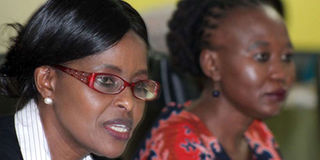Ruling should erase doubts on poll date

Independent Electoral and Boundaries Commission vice chairperson Consolata Nkatha speaks at KICC on July 20, 2017. The Court of Appeal ruled in favour of the IEBC on the ballot paper printing case. PHOTO | DENNIS ONSONGO | NATION MEDIA GROUP
What you need to know:
- The Appellate court overturned the earlier High Court ruling cancelling the printing of presidential election ballot papers.
- Mr Faki said Kenya’s stability is crucial for the region and the continental body wants the country to have a peaceful election.
Unless the opposition National Super Alliance challenges the decision in the Supreme Court, Thursday’s Court of Appeal ruling on the ballot paper printing case should remove one of the major uncertainties on whether the Independent Electoral and Boundaries Commission will be able to hold the General Election on August 8 as scheduled.
The Appellate court overturned the earlier High Court ruling cancelling the printing of presidential election ballot papers by Dubai company, Al Ghurair Printing and Publishing.
LEGAL FEES
However, there are still a number of pending cases against IEBC filed by Nasa or civil society groups that could still play havoc with the electoral timetable.
The legal duels in court aside, the various court challenges have taken on significant political hue in the campaign platforms.
President Uhuru Kenyatta’s Jubilee Party accused the opposition alliance led by Mr Raila Odinga of plotting to derail the election date with its incessant challenges against the electoral management body.
SABOTAGE
On Thursday morning, before the Appeals Court ruling, the President reiterated that position in a meeting with an African Union elections observer mission led by former South African President Thabo Mbeki and chairman of the AU Commission, Moussa Faki from Chad.
He accused the opposition of being out to sabotage the elections and to incite chaos and violence, citing the welter of court cases against the IEBC as well as constant accusations levelled at the security establishment.
STABILITY
President Kenyatta promised the AU delegation that the elections will be free, fair, transparent, credible and peaceful, and stressed that the elections must take place on August 8 as provided by the Constitution.
He decried Nasa’s refusal to make a similar commitment.
In return, Mr Faki said Kenya’s stability is crucial for the region and the continental body wants the country to have a peaceful election.
RIGGING
The meeting at State House was covered only by the official Presidential Strategic Communications Unit, so it was not immediately possible to get an independent report on the discussion and how the AU team responded.
However, Mr Faki and his colleagues had the previous day met Nasa presidential candidate Raila Odinga and his running-mate Kalonzo Musyoka and delivered the same message on the AU’s desire for free, fair and peaceful elections.
Briefing the press after the meeting, Mr Odinga said he had shared Nasa fears about plans to rig the elections, use of state resources and security organs in the Jubilee election campaigns, and the IEBC’s neutrality and preparedness.
VIOLENCE
Worries over violence also featured prominently in the meeting, with Mr Odinga promising the delegation that the opposition campaign is committed to ensuring that peace prevails before, during and after the elections.
As with the presidents meeting at State House, Mr Odinga’s meeting with the AU delegation was held behind closed doors at his Capitol Hill office, so there was no information on what else may have transpired.
CRISIS
It is likely that as legal challenges against IEBC persist, together with the increasing number of public accusations on alleged election rigging plans, the political temperature will continue to rise.
The more Nasa persists in that tone, the more Jubilee will accuse it of trying to force postponement of elections, which would create a constitutional crisis, or to incite chaos so that it can negotiate its ways into a government of national unity.
The Appeal Court ruling is therefore unlikely to mark the end of the climate of suspicion, mistrust and mutual hostility in the run-up to the elections.
That has in turn fuelled fears of a 2007-style disputed election followed by widespread violence that could tear the country apart.
Email: [email protected] Twitter: @MachariaGaitho





